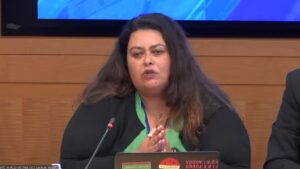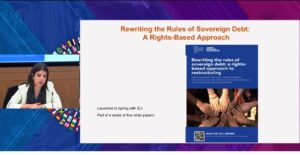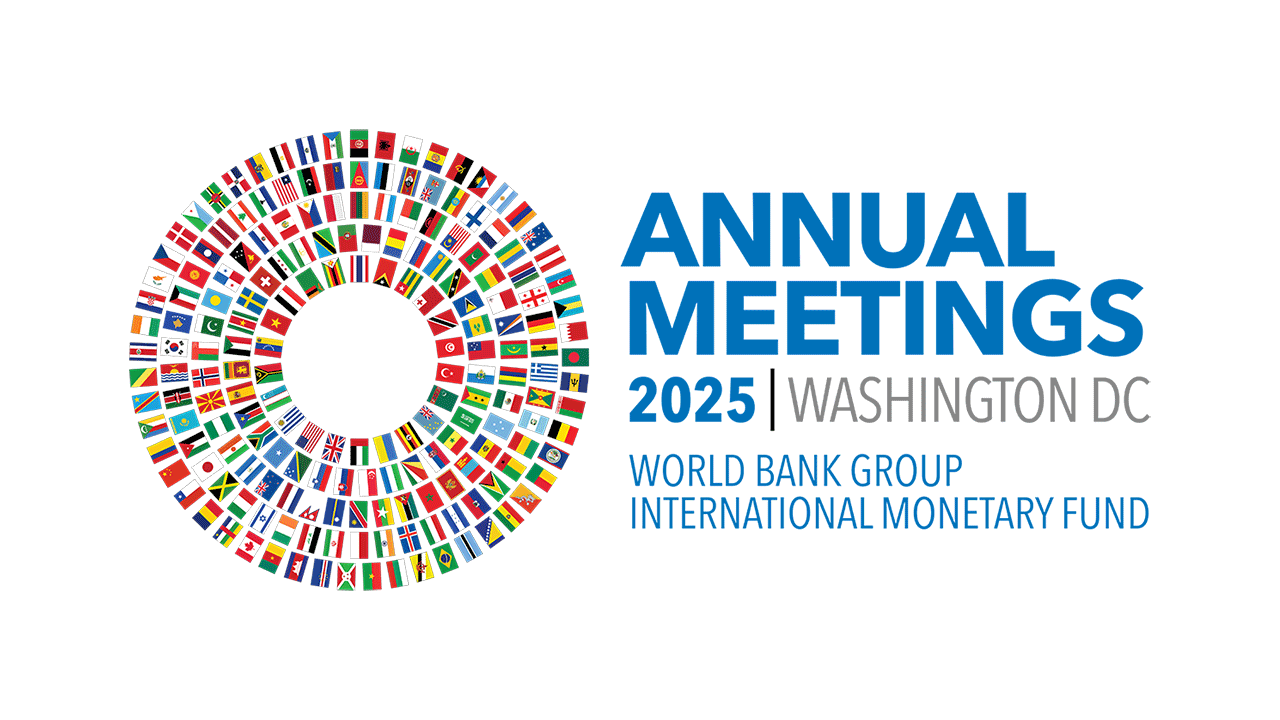Feminist Reflections on the 2025 IMF–World Bank Annual Meetings: Debt, Gender, Menstrual Health and the G20’s Limited Response

The 2025 Annual Meetings of the International Monetary Fund (IMF) and World Bank (WB), held in Washington D.C. from 13-18 October, came at a moment of acute global stress: rising public debt, climate breakdown, growing gender inequality and institutional legitimacy under question. While the official agenda included gender, climate and debt, the actual outcomes delivered little structural shift. For feminist organisations — particularly in the Middle East and North Africa (MENA) — the result is blunt: gender and menstrual-health issues remained invisible in core decisions, the G20 debt statement was limited, and climate was largely treated as a technical add-on.
Civil society and feminist advocates underscored that the so-called targeted social spending floors embedded in IMF programs are inconsistently implemented and often fail to reach their intended populations. Feminist organizations argue for a transformation toward universal social protection, financed through progressive taxation and public investment in care.
Moreover, civil society and feminists exposed the Fund’s internal optimism bias, a tendency to rely on unrealistically positive growth and revenue forecasts. When these projections fail to materialise, governments are pushed into harsher austerity measures to meet targets, deepening poverty and unpaid-care burdens.
These interventions mark a qualitative shift in global civil-society discourse. Rather than contending the side effects of IMF policies, feminist are interrogating their structural foundations. Without a transformation in the Fund’s mandate and decision-making power, institutional reforms will remain cosmetic rather than transformative.
A Summary of the Key Outcomes
G20 debt declaration and global debt front-and-centre
The G20 Finance Ministers and Central Bank Governors meeting on 15-16 October issued a dedicated debt communique — the first standalone G20 debt declaration since the pandemic — pledging to keep focus on developing-country debt and strengthen the G20 Common Framework for Debt Treatments in a “predictable, timely, orderly and coordinated manner.”
During the Meetings, the IMF’s Managing Director, Kristalina Georgieva, underlined the role of growing debt on the current economics crisis: “Growth is slow, debt is high, and the risks of financial downturn are quite permanent.” South Africa’s Reserve Bank Governor Lesetja Kganyago emphasised that debt is no longer only an emerging-market problem: even developed economies face more than 100% of GDP in debt by 2029 in adverse scenarios. Despite this acknowledgement of the global debt crisis, the G20’s declaration was lacking concrete new instruments — noting consensus on problem severity but little on solutions.
Civil society networks reiterated that debt distress is not a temporary macroeconomic problem but a permanent feature of an unequal global system. The absence of a binding, multilateral debt restructuring framework means that each “solution” only deepens dependency. Calls for a UN Framework Convention on Sovereign Debt — supported by many Global South governments and civil society groups — were ignored once again, largely blocked by powerful creditor states.
IMF/WB institutional statements: debt, growth, stability
The International Monetary and Financial Committee (IMFC) Chair’s statement emphasised assisting countries with high debt-service pressures, mobilising domestic resources, attracting private capital, and supporting growth-enhancing reforms. At the Plenary, WB President Ajay Banga stated that the Bank aims to increase job creation across sectors through a “three-pillar strategy” focused on foundation (infrastructure), policy (rules), and capital (private sector).
The so-called climate finance initiatives remain a betrayal to frontline nations. Prioritizing private investment and allowing funding for fossil fuel projects contradicts the urgency of the climate crisis, only further indebting and locking us into harmful energy futures. In fact, nearly 80 percent of climate finance reaching developing countries still comes in the form of loans thus creating new debt in the name of sustainability. Climate action cannot be debt-creating — it must be grant-based, equitable, and aligned with community-led priorities.
Civil Society Policy Forum (CSPF) and wider engagements
The CSPF ran in parallel to the Meetings with 33 sessions covering topics from job creation, gender, health, agribusiness, and many others. However, across all subjects, there were major disconnects between the arguments presented by civil society and institutional decisions made by the IMF and WB.
Targeted schemes rely on means-testing and narrow eligibility categories, producing high exclusion errors, administrative complexity, and stigma for recipients. On the other hand, universal protection guarantees essential services and income security to everyone, funded through progressive taxation and anchored in rights rather than charity.
Feminist economists emphasise that a truly inclusive approach must measure whether social protection programs cover informal workers, reduce women unpaid-care time, and shorten access gap to health, education, water, and menstrual-health services. When these outcomes are absent, the program design must shift from targeting to universality.
Based on the key outcomes outlined above, MENAFem Movement has put together an article reflecting on how gender and climate were sidelined at the 2025 IMF/WB Annual Meetings:
What the Meetings Emphasised
Debt, fiscal discipline and macro-stability

The dominant talking point of this year’s annual meetings centred on rising debt burdens and the need for fiscal consolidation. Reports show global public debt may hit about 100% of GDP in the coming years. Discussions focused on revenue mobilisation, debt restructuring and debt-service management — but rarely on how these connect to gendered social impacts.
Furthermore, the Fund’s persistent optimism bias in its economic models has concrete social costs. By assuming higher growth and revenue than realistic, it underestimates the fiscal space needed for essential spending. When projections fail, austerity intensifies, transferring the cost of adjustment for states to households. This dynamic has profoundly gendered dimensions; as public care, health, and education systems shrink, women’s unpaid labour expands to fill the void.
Jobs, private sector growth and infrastructure
While WB president Ajay Banga gave a speech at the plenary emphasising the importance of secure jobs, the overall speech still lacked coherent language about unpaid care work, menstrual health infrastructure, or gender-responsive climate adaptation.
The Mission 300 initiative was highlighted as a major effort to accelerate energy access in Sub-Saharan Africa by connecting 300 million people to electricity by 2030. This initiative is a collaborative effort led by the WB and the African Development Bank, aiming to bring affordable, reliable, and sustainable power through grid expansion, mini-grids, and standalone solar solutions.
However the initiative’s overreliance on private investment rather than public finance raises doubts about its ability to deliver equitable, sustainable development. The Bank’s openness to financing fossil fuel projects under the guise of this program risks locking African countries into high-emission and high-debt pathways, contradicting the urgent need for climate justice.
How Gender and Climate Got Ignored

Gender justice treated as peripheral
At the Meetings, official communiqués and statements prioritized growth and debt rather than care-economy investments and women’s voices and gender-differentiated impacts were seldom integrated into the financial architecture deliberations. This is evident from the IMF’s decision to restructure its climate and gender units by folding into one which signals de-prioritisation of specialised gender work.
Climate finance framed as mobilising private capital — not justice
Similar to the limitations observed with gender-related topics, the emphasis remained on scaling up private investment and infrastructure rather than on outcomes centred on achieving a just green transition or acknowledging the polluter-pays and common but differentiated responsibilities principles.
Feminist critique also points to the omission of discussions around how climate finance often adds new debt burdens and unpaid care burdens for women, especially in Global South/MENA contexts. This echoes what feminist organizations said in a letter published in the Financial Times earlier this year flagging that climate change was “not on the menu” and that institutions referred to gender and climate as “mission creep.”
Governance and decision-making still dominated by the few
Decision-making at IMF/WB remains set in structures where Global North creditor states hold disproportionate power. Feminist critiques argue this perpetuates economic and gender injustice. The Meetings this year have once again made clear that despite increasing civil society presence, the institutional reforms needed to shift power have not yet been realised. For feminist economic transformation to take root, both mandate and membership must change.
Implications for Women in the MENA Region and Beyond
In the MENA region, the omission of gender and climate in global finance conversations has direct consequences:
- Many MENA countries face rising public debt and limited fiscal space. If debt servicing and austerity dominate, public services such as health, education, menstrual health facilities, water/sanitation and childcare will bear cuts.
- Women’s labour force participation remains low in parts of the region. If growth models emphasise private investment without care infrastructure, women remain marginalised.
- Energy-transition agendas may focus on large infrastructure rather than household-level access, clean energy for women, or care-friendly design. Without a gender lens, those transitions risk reinforcing inequality.
- Refugee, migrant, informal economy women already carry disproportionate burdens; when global finance ignores gender/climate, these burdens deepen.
Globally, the sidelining of gender and care work in the 2025 Meetings signals systemic risk: economic governance continues to undervalue the invisible labour and service systems that sustain societies.
Feminist Demands and Pathways Forward

Before, during, and after the implementation of any IMF and WB program, a Right-Based Impact Test should be mandatory, which would ask main questions related to the impact of the proposed condition on the right to health, education, food, or water, including menstrual-health infrastructure. Moreover, they should ask questions about the effect of these conditions on gender inequality or women’s unpaid-care, and if these conditions heighten climate and environmental risks for vulnerable groups.
In light of the 2025 outcomes, MENAFem demands the following:
Embed gender and menstrual health into macro-finance frameworks:
- Institutionalise gender-responsive budgets, time-use surveys, unpaid labour valuation in IMF/WB programmes.
- Recognise menstrual health and care infrastructure as economic infrastructure.
- Ensure climate-finance and debt-treatment instruments carry gender-menstrual-care impact assessments.
Make debt justice be gender and care justice:
- Advocate for a binding Sovereign Debt Convention that integrates gender, care and climate criteria.
- Prioritise grant-based financing (not loans) for care, health, education, sanitation and menstrual infrastructure in MENA/Global South.
- Insist on gender-differentiated analyses of debt servicing and fiscal consolidation.
Ensure climate transition is gender-just and debt-free:
- Deliver climate finance primarily via grants, avoid new debt burdens for women and underserved communities.
- Design energy-transition policies in MENA that integrate women’s unpaid care burdens, menstrual health, local ownership and decentralised access.
- Mandate reporting on gender-climate-care outcomes, not just infrastructure or private-capital mobilization.
Advance governance reform to integrate meaningful feminist voices:
- A binding Sovereign Debt Convention that integrates gender, climate, unpaid care and rights from the start of debt treatment frameworks.
- Institutional mandates at IMF/WB that require gender-responsive budgeting, care infrastructure investment (childcare, eldercare, sanitation, menstrual health) and unpaid labour accounting.
- Climate finance is delivered primarily via grants rather than debt-creating instruments, especially for Global South/ MENA, and with built-in gender and care justice metrics.
Transparency and accountability:
- Public registries of debt contracts, loan terms, creditor lists and gender-/menstrual-health-impact chambers.
- Civil society and feminist networks must be resourced to monitor and track gender/climate/care outcomes of global finance.
- All G20, IMF, WB statements must include measurable commitments on gender, care work reductions.
Why 2025 Matters — And Why We Must Act
The 2025 Annual Meetings revealed a major fault-line: even as debt, climate and inequality converge, gender, menstrual health and care economies were not central to the global finance agenda. For feminist movements this is a clarifying moment: if global financial institutions do not embed gender/climate/care mandates now, the next decade will deepen exclusion even further.
For MENA and the Global South, the risk is urgent. Public-service cuts, unpaid labour burdens, climate shocks, and service-gaps multiply when global architecture ignores gender. The time for feminist economic transformation is now.
The 2025 IMF/WB Annual Meetings took place in a moment of global crisis. Yet, from a feminist view, the outcome was striking: gender justice and climate justice were sidelined. Debt and growth remained core but care, unpaid labour, menstrual health and women’s economic agency were treated as side-events.
If we are serious about economies that serve everyone — not just capital, growth and creditors — then gender and climate justice must be central. The feminist movement is ready. The institutions and their governance must respond.
The Meetings concludes this year leaving us with a big question and concern on what multilateralism means, how effective it really is, or whether it has become a dead horse.


